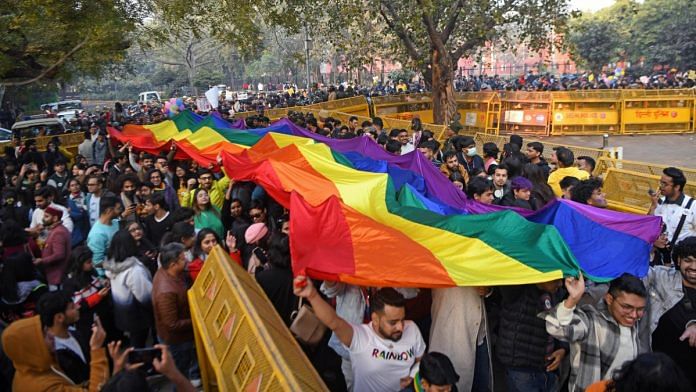New Delhi: Hindus are more accepting of same-sex relationships than any other community. And Indians’ acceptance of same-sex relationships is standard across urban and rural areas regardless of income. These are the findings of a survey that contrast sharply with the Narendra Modi government’s claim that advocacy of same-sex marriage reflects “urban elitist views”.
The government made the assertion in an affidavit filed before a Constitution Bench of the Supreme Court that’s hearing a clutch of petitions seeking legal recognition for same-sex marriages in India. But on Wednesday, the bench pointed out that the government was yet to present any official data to substantiate this.
Although there’s no government data on how Indians perceive homosexuality, a survey of more than 24,000 respondents from 12 Indian states, carried out in 2018-19, demonstrates that acceptance of same-sex relationships is neither urban nor elite.
The findings of the survey — conducted by the Delhi-based think tank Centre for the Study Developing Societies (CSDS)-Lokniti in collaboration with Azim Premji University in Bengaluru — were published in a report titled ‘Politics and Society Between Elections 2019’.
More than half of the respondents disapproved of recognition for same-sex relationships. The survey also found that Uttar Pradesh does better than the national average when it comes to accepting such relationships, while two of the most literate states — Kerala and Mizoram — fare worse.
Also Read: SC firm on gay advocate Saurabh Kirpal’s Delhi HC appointment — ‘provide inclusion & diversity’
Rejection rate higher among urban respondents
The findings of the survey contradict popular perceptions about Indians’ acceptance of same-sex relationships.
Asked if society should accept same-sex relationships, 19 per cent each in urban and rural areas replied in the affirmative.
At the same time, nearly 59 per cent of urban respondents said they did not want society to accept same-sex relationships — a view shared by 53 per cent of rural respondents.
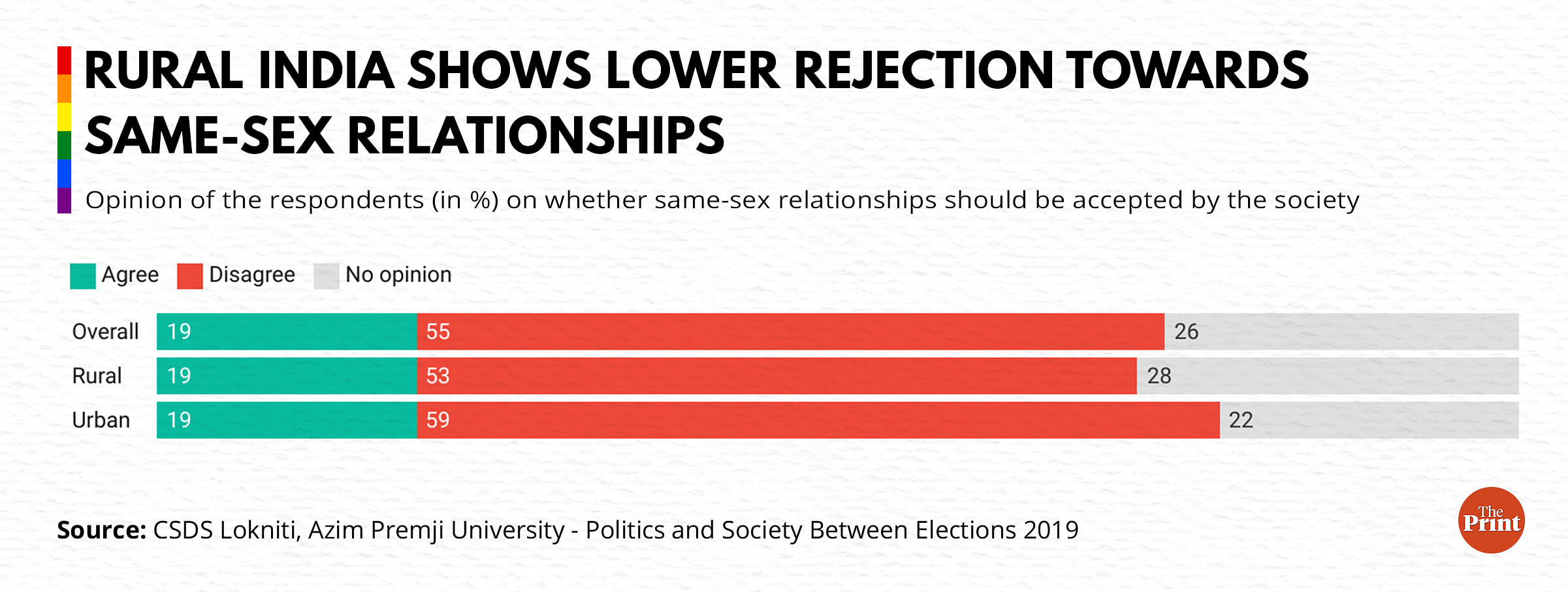
The rural-urban divide in terms of acceptance of homosexuality may also stem from the fact that nearly 28 per cent of rural respondents did not have an opinion on this issue, compared to 22 per cent of urban respondents.
“It could be because homosexuality is a taboo in rural areas. It is a topic that is less discussed, so a large section of society doesn’t have an opinion because their media exposure around such issues could be low,” said Professor Sanjay Kumar, co-director of Lokniti-CSDS.
Media exposure & elitism myth
Building on the argument that the media plays a key role in shaping opinion around LGBTQIA+, the survey found that increased media exposure leads to higher acceptance of same-sex relationships.
The findings also show that only 10 per cent of respondents with no media exposure tend to exhibit acceptance of same-sex relationships. The acceptance rate can go as high as 33 per cent for those with very high media exposure.
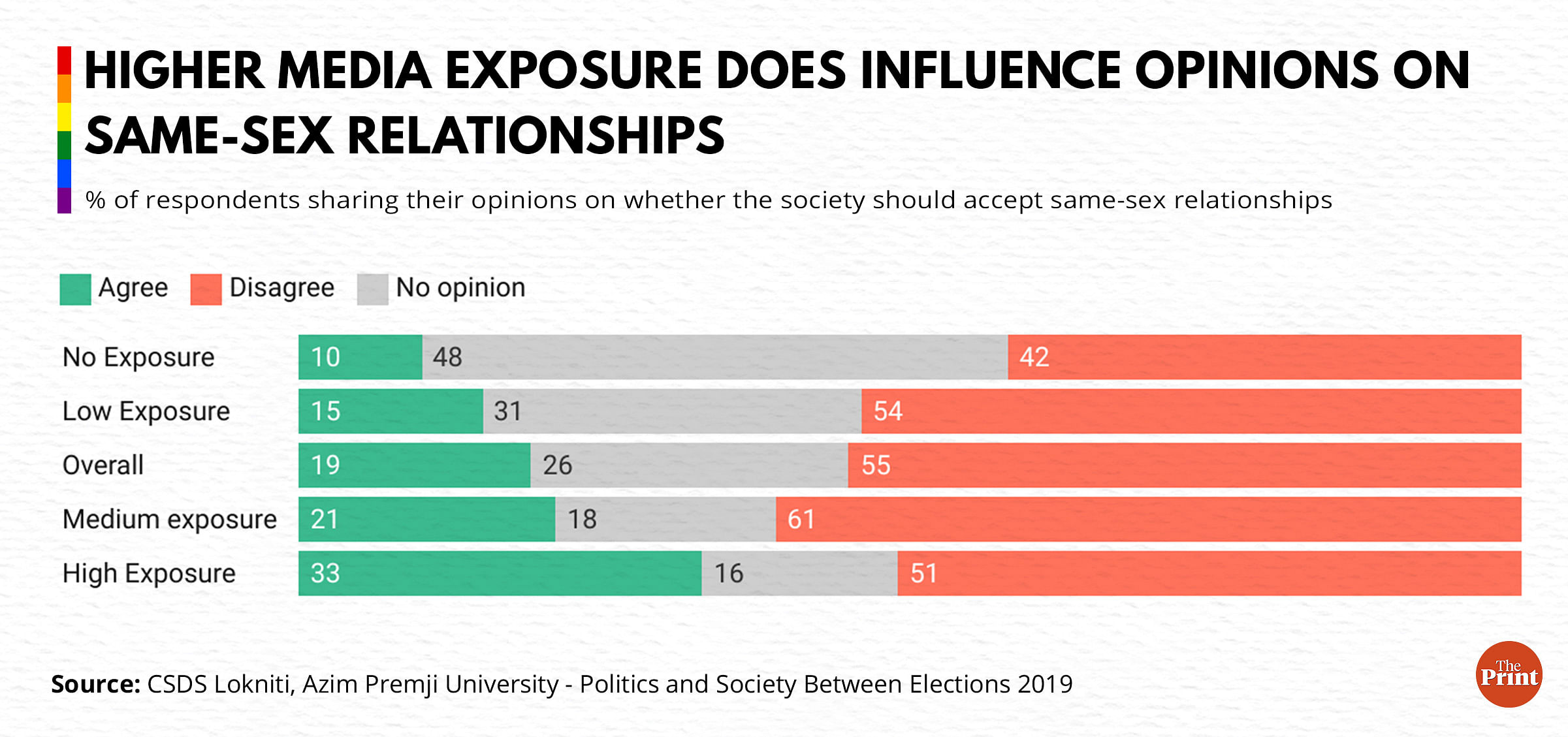
Although the rejection rate is higher than the acceptance rate across all categories of media exposure, this gap narrows when media exposure is high. This means that 33 per cent of respondents in the high media exposure category accept same-sex relationships, compared to 10 per cent of respondents in the low media exposure category.
The findings also counter the perception that same-sex relationships find higher acceptance among Indian elites. The survey has found no such pattern linking income distribution to views on homosexuality.
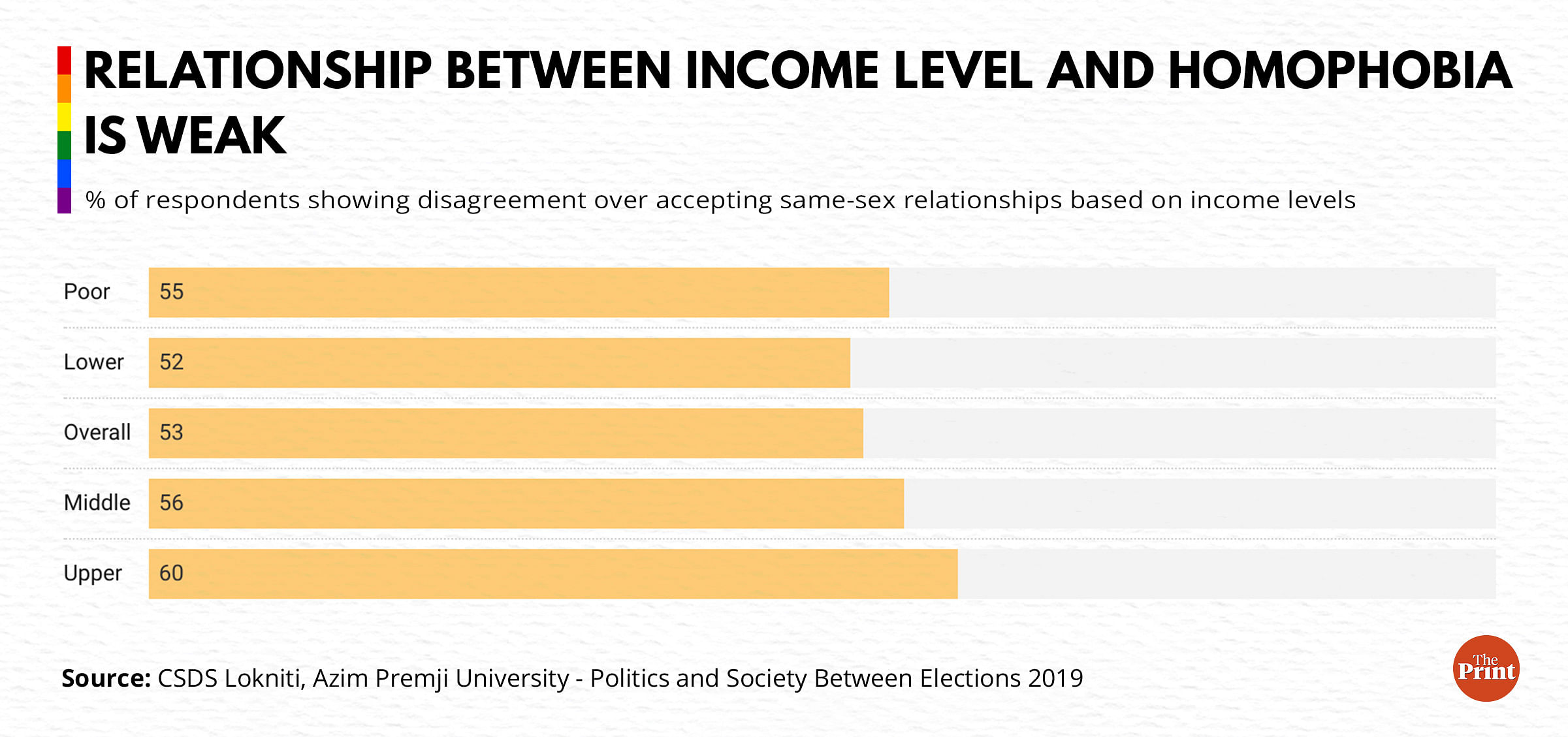
About 55 per cent of respondents in the lowest wealth quartile and 60 per cent in the top wealth quartile said they did not want society to accept same-sex relationships. In the case of the middle class (both upper and lower), the rejection rate stood between 52 per cent and 56 per cent.
Overall, more than a quarter of respondents had no opinion on the issue, with an increase in wealth leading to a dip in the share of such respondents. This indicates that income does shape one’s opinion on same-sex relationships, but higher income doesn’t necessarily lead to a tilt towards acceptance.
“While the results seem ambiguous, a definitive result is the fall in the share of ‘No Opinion’ responses by 18 percentage points between the poor and the upper class. The results suggest that class is not a significant determining factor on social attitudes towards sexual orientation,” read the report.
Acceptance rate highest in UP, among Hindus
One of the most striking features of the study was the heterogeneity in acceptance rates across the surveyed states.
Against the acceptance rate of 19 per cent across all states surveyed, this number was highest at 36 per cent in Uttar Pradesh. UP is followed by Tamil Nadu and Delhi, where 30 per cent of respondents were accepting of homosexual relationships.
In contrast, Mizoram and Kerala — two states with relatively high literacy rates — exhibited strong disapproval of same-sex relationships. About 91 per cent of respondents in Mizoram and 63 per cent in Kerala rejected same-sex relationships; acceptance rates in these two states were also low, at 7 per cent and 19 per cent respectively.
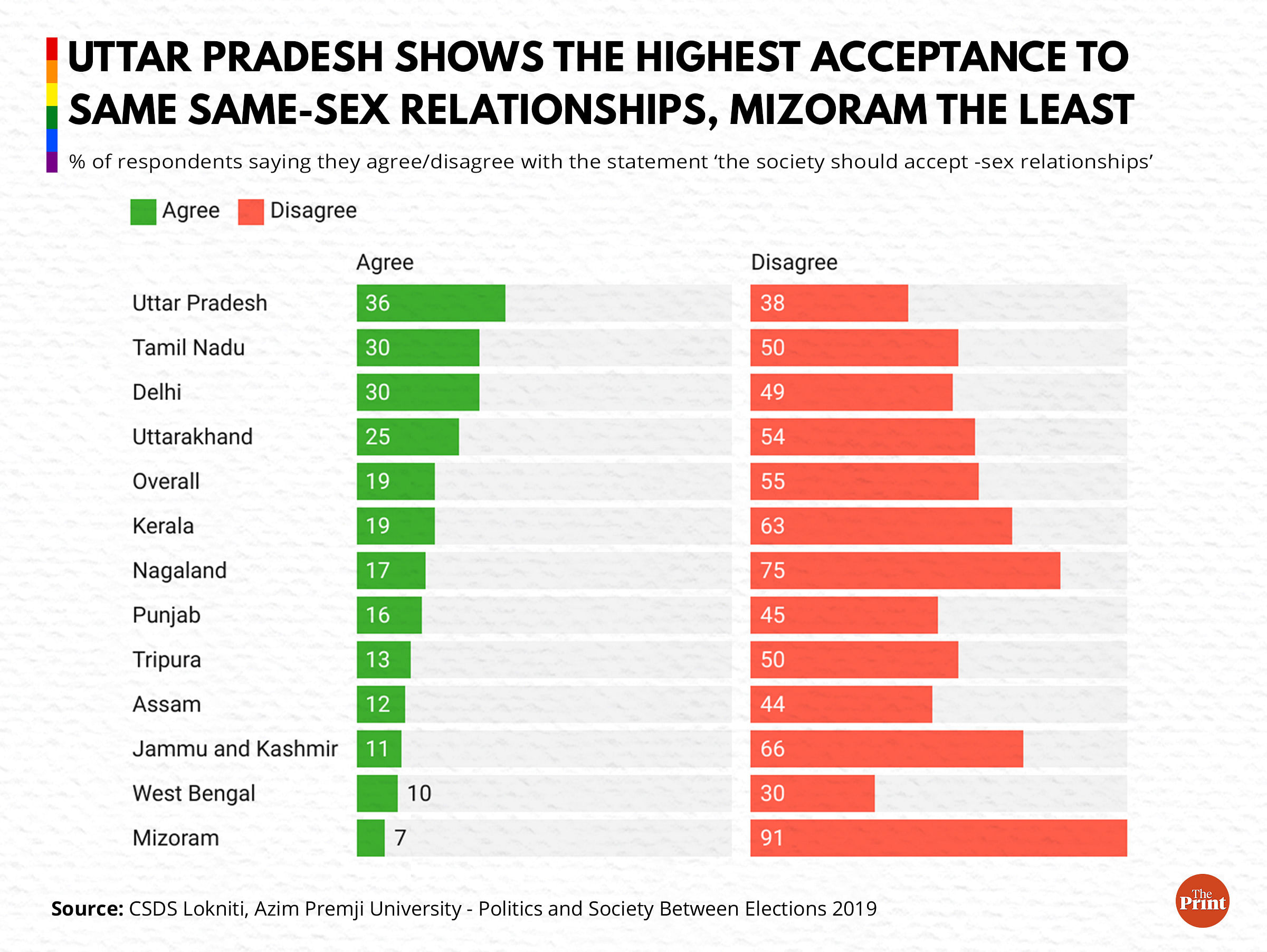
At least 66 per cent of respondents in the erstwhile state of Jammu and Kashmir and 45 per cent in Punjab disapproved of same-sex relationships.
Further, the survey revealed that same-sex relationships are not widely accepted across all religions.
Over 78 per cent of Christian respondents and more than half of the Muslim respondents (57 per cent) said they did not want society to accept homosexual relationships. The rejection rate was 46 per cent among Sikhs and 47 per cent among Hindus — lower than the national average (rejection rate) of 55 per cent.
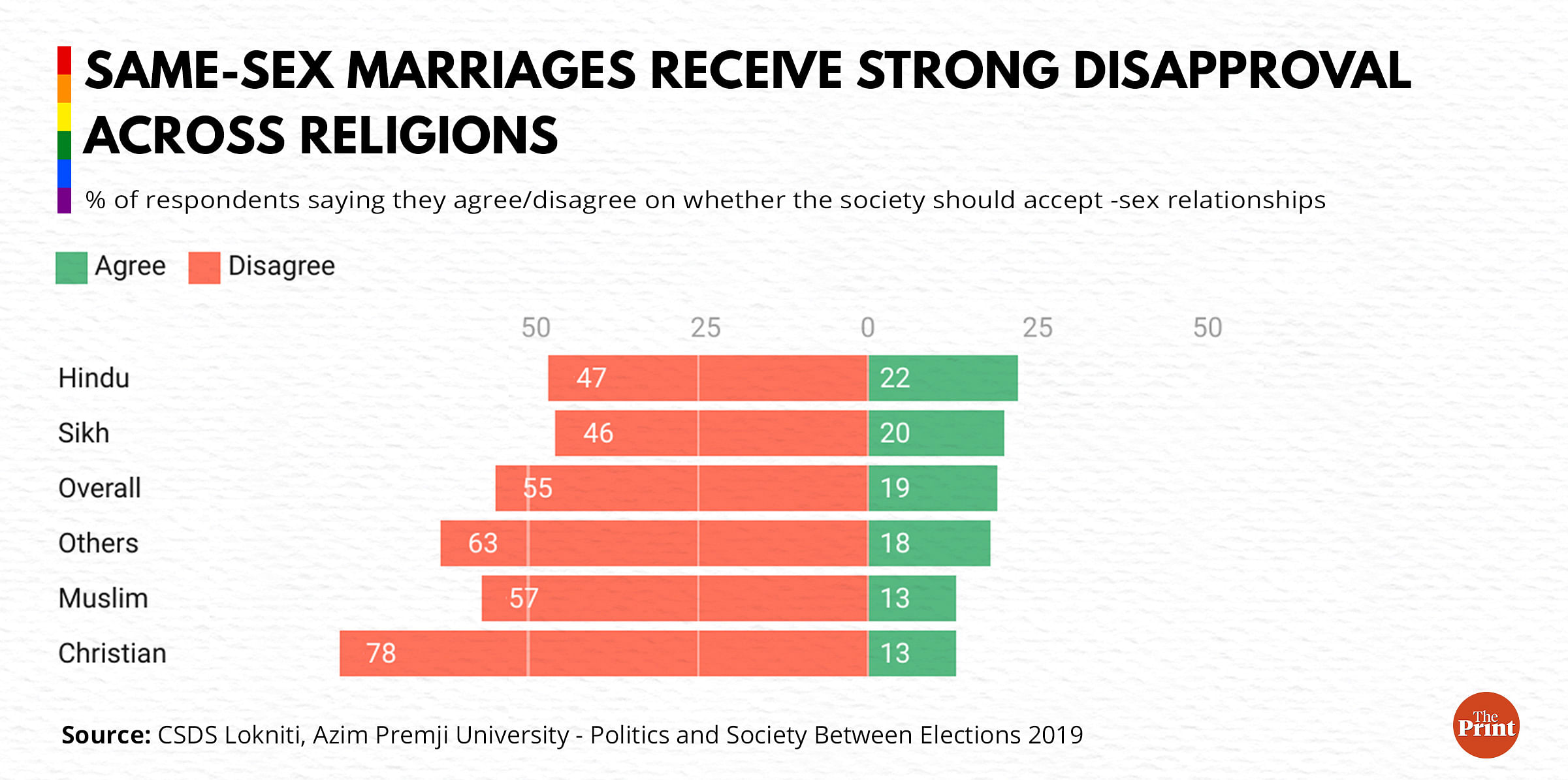
However, among those who were accepting of same-sex relationships, the share of Hindus was the highest. Nearly one in every five Hindus (22 per cent) agreed that society should accept same-sex relationships. This number was 13 per cent for Christians and Muslims, and 20 per cent for Sikhs.
“One thing we observed from this survey is that India’s minorities tend to strongly reject same-sex relationships. The religiosity in the state could be a link in defining their attitude towards such unions,” said Sanjay Kumar.
(Edited by Amrtansh Arora)
Also Read: Chandigarh pride parade keeps politics out, culture in—Jaago, boliyan, gidda


